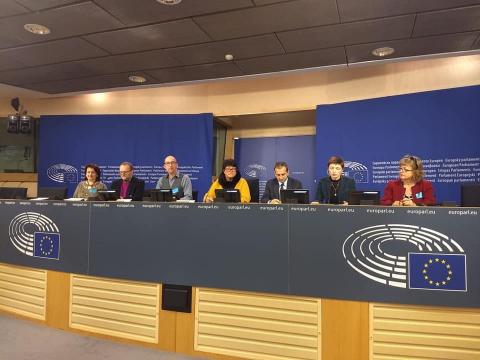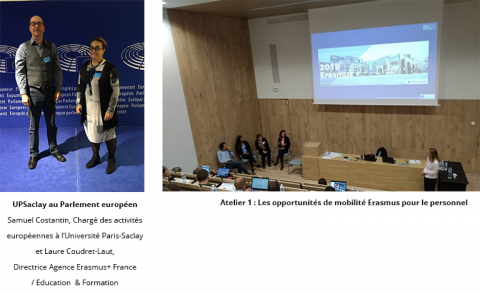
ERASMUSDAYS AT UNIVERSITE PARIS-SACLAY: ERASMUS+ TRAINING AND EUROPEAN RECOGNITION
The second edition of ErasmusDays, dedicated to the training of teachers-researchers on Erasmus+ opportunities, was highlighted by recognition from European authorities.
This year’s edition was dedicated to the training of teachers-researchers in Erasmus+ programmes to foster the submission of Erasmus+ projects in 2020, and to the continued promotion of the EUGLOH European Alliance.
The Erasmus+ National Agency, in recognition of this work, invited Université Paris-Saclay to participate in the National Launch of ErasmusDays at the representation of the European Commission in Paris. The following day, Université Paris-Saclay was also represented at the European Parliament to present our event. These invitations are a testimony to the work that we have been carrying out at Université Paris-Saclay on the Erasmus+ programme together with EUGLOH.
Presenting Erasmus+ opportunities
At Université Paris-Saclay, almost 90 participants discovered the opportunities offered by the programme. Mathilde Bégrand, Head of the Promotion division – Higher Education at the National Erasmus+ Agency introduced Erasmus+ actions and the 2020 Call for proposals. During his keynote speech, Patrick Jacob, Vice-Dean in Charge of International Relations at the Law and Political Sciences Faculty of Université Versailles Saint-Quentin-en-Yvelines, highlighted the added value of student mobility. He also underscored the impact of these projects in the constitution of relevant partnerships, an in particular for research.
Staff Mobility – key towards the internationalisation of higher education institutions
In workshop 1, academic and administrative staff from the member institutions of Université Paris-Saclay shared their mobility experience. Participants lauded the energy of the workshop moderated by Cristina Maniu, Professor at CentraleSupélec, who convinced them of the benefit of such an experience. As such, past Erasmus+ mobilities have enabled beneficiaries to build relevant partnerships for education and research activities. They also encouraged staff to get more involved in the international activities organized by their institution.
Teaching Opportunities of the programme
The second workshop, dedicated to teaching opportunities, was moderated by Isabelle Ledoux, coordinator of the UPSaclay Monabiphot Master’s programme, who introduced Strategic Partnership and the programme of excellence Erasmus Mundus Joint Master Degree. Harald Schraeder, Director of International Relations of Université Versailles Saint-Quentin-en-Yvelines shared his experience of building a joint project thanks to the 3IPEP Strategic Partnership coordinated by UVSQ. Stéphanie Baumberger, coordinator of the new Erasmus Mundus Joint Master Degree Bioceb at AgroParisTech, presented together with Marine Godaux, Head of the European Affairs Unit of AgroParisTech, the different steps to establish this kind of Masters. This was the perfect opportunity for the attendance to have access to concrete information in this respect.
International Opportunities of the programme
Workshop 3, dedicated to the international opportunities of the programme, was moderated by Pascale Vareille, Head of the International Unit at IUT Cachan, Université Paris-Sud, described the International Credit Mobility programme ( ICM - Ingoing and Outgoing Mobility with Non-European Countries). Three Project Coordinators presented their international collaborations: Marc Zolver (CentraleSupélec), Alain Sarkissian and Mustapha Meftah (UVSQ), and Sergey Barsuk (UPSud). Then Arezki Cherfaoui and Patrick Bonnin, teachers-researchers and assessors of IMC projects, presented the criteria necessary for a successful application. Mathilde Bégrand, Head of the Promotion division – Higher Education at the Erasmus+ National Agency, introduced the Capacity Building Programme, which promotes the modernisation of Higher Education Institutions of Partners Countries (Non-European Countries). She particularly insisted on the complementarity between an ICM project and a Capacity Building Project.
EUGLOH and ERASMUS+
The last part of the afternoon was dedicated to the EUGLOH Round-Table. Sandrine Lacombe, Vice-President of International Affairs at Université Paris-Sud and Coordinator of EUGLOH, introduced the actions planned to increase mobility within the Alliance. Julia Tepel, Manager of the Project, indicated that EUGLOH actions will be coordinated with Erasmus+ funding. José Castro Lopes, Vice-Rector, explained the interest of the project for the Faculty of Medicine. This alliance is thus a true asset to the development of mobility and the construction of a European campus.
Sylvie Retailleau, President of Université Paris-Saclay, concluded the event by underlining the importance of the Erasmus+ programme and EUGLOH for the internationalisation of our institution.
The teachers-researchers pursued theirs discussions during the cocktail. New projects will definitely be submitted in 2020!
Evolution of the programme
Erasmus has now become the key programme for international cooperation and European citizenship. The new team of the European Commission, which will take office on December 1st, supports more than ever this development by defending the doubling or the tripling of the budget within the framework of the new 2021 -2027 programme (As indicated in the mission letter by Mariya Gabriel, new Commissioner for Innovation and Youth).
Headline picture: Samuel Costantin, European Projects Officer at Université Paris-Saclay introducing our event at European Parliament

